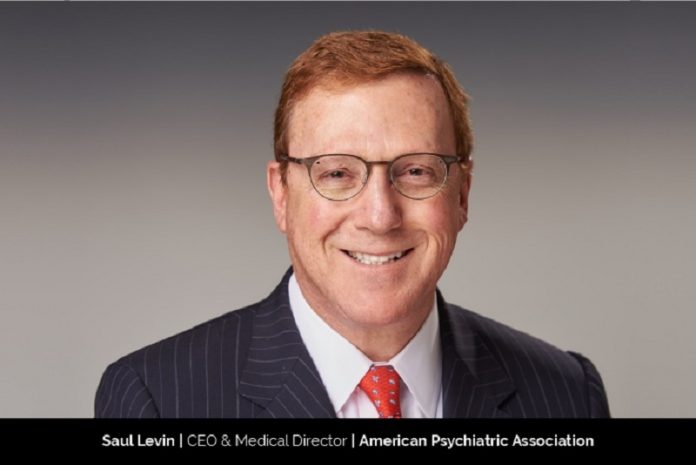Saul Levin, MD, MPA, FRCP-E, FRCPsych, is committed to contributing to the betterment of people’s mental health and to the mental health of society. As CEO and Medical Director of the American Psychiatric Association (APA), he is ensuring that the work they do at the organization is medically correct and always in the best interest of their patients and their profession.
Dr. Levin is responsible for directing the day-to-day operations of the APA, conferring with the Board of Trustees, and communicating with all its members. He also serves as a spokesperson for the organization and the profession of psychiatry, informing the media and the public. Moreover, Dr. Levin works with lawmakers at the federal and state level on issues related to mental health and substance use disorders and represents APA and American psychiatry at meetings and conferences with international organizations and other psychiatric groups based overseas.
“Part of my job also involves coordinating and collaborating with other physician and health and business leaders that belong to these international groups for the betterment of psychiatry worldwide,” Dr. Levin says. “Central to all these responsibilities are my ongoing commitment to the community and to all those we serve.”
American Psychiatric Association: The Oldest National Medical Association in the U.S.
Founded in 1844, the American Psychiatric Association is the oldest national medical association in the U.S. Dr. Levin says that since its founding, the organization has been a driver in achieving new, more informed levels of knowledge about mental health. Along with that, it is always in an evolving process of improvement for its patients and constituencies. “The APA stands today as an active, modern organization looking to ensure the treatment provided to patients by our member psychiatrists is of the highest quality, validated through research and clinical experience,” Dr. Levin says.
He also says that their goal is to facilitate and improve the practice of psychiatry, and through that to help patients and their families to better understand what their illnesses are about and what they can do to help them, just as any other doctor would.
APA Relies on Medical Research
To achieve a culture of effectiveness, integrity, and innovation, APA relies on medical researchers in the academic centers in the U.S. and around the world who are doing incredible work. “It is for us to take what they find and implement it as best we can,” Dr. Levin says.
He also highlights that science and medicine is just in its young adulthood in truly understanding the psychological and psychiatric aspects of the brain as well as the true and varied meanings of mental wellness. “This requires understanding the physical aspects of our brains and the complex relationship of the brain to our minds and behaviors,” he says, adding that it also requires an expanding understanding of life contexts, social determinants of mental health, as well as the impact of historical and structural impediments.
“Psychiatry relies on researchers, clinicians, community/constituency advocates, patients, and others to work together to push those frontiers that help us discover treatments and innovations that are improving and saving the lives of our patients and helping them live to their fullest potentials,” Dr. Levin adds. APA stands at the vanguard of this mission and effort. The organization is forging and convening cross-sector partnerships and assists in the translation and implementation of research findings that lead to therapeutic options and improvements. APA understands and is involved in the regulatory requirements of psychiatric licensing and practice, Dr. Levin says. “As part of this, among its varied functions, the APA has a key responsibility for publishing and regularly updating the diagnostic manual of psychiatry, the Diagnostic and Statistical Manual of Mental Disorders (DSM-5). As progress is made, the DSM is defining and refining the field and meaning of psychiatry, identifying specific criteria for mental illnesses and ways to achieve and maintain optimal mental wellness.”
“I see my responsibilities at the helm of the APA on both the micro/daily level and the macro/long view level as leading these efforts and effecting change where and when needed,” Dr. Levin adds.
Life Before Becoming the First Openly Gay CEO of APA
Dr. Levin was born in South Africa and studied medicine at the University of Witwatersrand in Johannesburg. While growing up there, he witnessed the injustice and impact of apartheid and the AIDS crisis, which had a big impact on him. “That was a big reason why I wanted to pursue a profession where I could help others,” Dr. Levin says.
After completing his psychiatric residency in the United States at the University of California, Davis, Dr. Levin began working as a special expert appointee in the federal government at the U.S. Department of Health and Human Services (HHS), Alcohol, Drug Abuse and Mental Health Administration (ADAMHA), later known as the Substance Abuse and Mental Health Services Association (SAMHSA). “This was during the height of the AIDS crisis in the U.S., and I had the unique opportunity to use my position to make a difference,” he says.
Later, Dr. Levin served as President and CEO of Medical Education for South African Blacks (MESAB), a USA-based anti-apartheid, NGO dedicated to providing South African Black students with scholarships and resources to enter the health sciences. Initially, MESAB supported students when the apartheid government wouldn’t give scholarships to Black students to enter the medical and health field. MESAB continued this mission when the New Democratic Government of President Nelson Mandela funded such education regardless of color, race, or ethnicity.
After four years at the helm of MESAB, affecting change and working to advance its mission, Dr. Levin says that they achieved a high level of success that included folding the MESAB programs and approach as an ongoing part of the new South African government. “I was extremely gratified to have had the opportunity to lead this important organization during times of intense adversity, it being key in diversifying and expanding the South African healthcare systems and health leadership for generations to come,” Dr. Levin says.
He also considers serving his community in the Gay and Lesbian Medical Association (GLMA) as another highlight of his career. The GLMA is committed to promoting equal care for all LGBTQ persons, ensuring that when an LGBTQ person seeks out health care that their needs are attended to with the same cultural competency as any other person seeking health care.
After serving in the AMA House of Delegates for more than a decade, Dr. Levin accepted a position in the Administration of the AMA to be the Vice President of AMA in Science, Medicine, and Public Health. “My job included areas such as Diversity and Equity, Disaster Preparedness and Response, Science and Technology, and Physician Health and Wellbeing, as well as the program that named new drugs coming onto the market called the USAN,” he says.
After serving at AMA, Dr Levin led the District of Columbia Department of Health. Dr. Levin recalls that during his first year in that role, a piece of legislation came before his desk that would allow transgender individuals to correct their birth certificates to reflect the gender they identify with. “I advocated to the Mayor to pass the bill, and at the time it became the most inclusive transgender birth certificate bill in the country, and it was ranked one of the top 10 legislative victories in the United States by the National Center for Transgender Equality,” he says.
With the consent of the Mayor, Dr. Levin also began the process of integrating mental health and substance use departments of prevention and treatment and recovery under one Department of Behavioral Health and ensured that it was part of the continuum of care within the healthcare system. Shortly after that in 2013, he was appointed to head APA as the CEO and Medical Director, the first openly gay person to hold that position.
Dr. Levin became a member of the APA in 1987. As a member, he had served on committees and councils within and outside of the organization over the years. “It is a great honor and privilege to serve my colleagues and work to ensure parity of services and care to ensure all persons in the healthcare system get mental health care,” Dr. Levin says.
Throughout his life, Dr. Levin’s parents and key mentors – from grade school, medical school, residency training, post-medical graduate school, at the APA, the AMA, as well as from his time in federal and city governments and in leadership positions in the private healthcare delivery sector – have helped him to see himself as a “change agent” with a responsibility to achieve what he can, the best he can, toward the betterment of all.
Like all health issues, research is at the core of identifying what an illness is and how to treat it. Dr. Levin says that the same is true for mental illness, but due to the complexity of the brain, the mind, and human behavior in general, scientific progress has taken somewhat longer. “We are not able to truly visualize the brain and mental illness as we would a physical ailment,” he says, adding that in this respect, science and technology have been a huge help, especially over the last three decades.
Dr. Levin also says that there is an interplay between art and science in psychiatry, and technology assists in that interplay. “The art is talking with our patients about their problems and helping them to work through issues they are facing,” he adds. “The science of it has helped us better understand the workings of the billions of cells and neuronal connections in our brains and what that all means in terms of our thinking processes and our mental wellness.”
Dr. Levin also points out that as scientists, researchers, and psychiatrists gain more understanding, they are developing new treatment methods. He is hopeful that one day this will enable mental disorders to be cured just like any other physical ailment, and to help people to better cope with their physical and mental disorders, using innovative treatments to live complete and fulfilling lives.
Success is Ensuring APA Makes Progress
When APA, or any of the organizations he has spearheaded, makes progress in its mission, and is strengthened for its membership and the constituencies they serve, Dr. Levin knows they’ve achieved success. “Success is taking an idea or innovation and effectively and efficiently improving upon what is, advancing our science and elevating the lives of our patients,” he says. “Success is also achieving collective solutions based on the strengths of richly varied perspectives, constituency groups, and strategic priorities.”
Hiccups Along the Way
Dr. Levin does not like to view challenges as roadblocks. He says that they are more like “hiccups along the way” or problems that are meant to be solved. He has learned that it is extremely valuable to identify when the chosen path is not working by evaluating data and other new facts, and/or through an innate ability to recognize when change needs to happen. After that, one needs to have the skill and experience to quickly adapt and shift to a path more appropriate for achieving success, Dr. Levin says.
Dr. Levin says that those who have responsibility as leaders build positive outcomes through their leadership and with the support of the people they are working with. “Once one takes the required steps at the appropriate time to engage and involve partners within and outside the association or organization, one gets a truer picture of what is needed, the complexities involved, and the critical need to acknowledge the informed opinions, beliefs, and experiences of different people and groups,” Dr. Levin says.
“Leadership often requires the difficult skill to see how best to facilitate all involved to seek the common good of getting to a goal that helps all parties and those they represent,” he adds.
Vision for the American Psychiatric Association
APA’s vision is to promote and advance the profession of psychiatry and the cause of mental health care in America, to help advance cutting-edge new treatments and medical research, and also to recognize and address the cultural and social aspects of psychiatry and mental illness. Dr. Levin says that the organization needs to ensure through a culture and commitment to diversity, equity, and inclusion, that everyone who needs it has access to the treatment they require in a manner that is responsive and effective.
Plans for the Future of American Psychiatric Association
Dr. Levin points out that human society is more globalized than ever, and technology and innovation in communications have made APA more connected with their colleagues both in the U.S. and overseas than ever thought possible before. “APA is an important part of the larger global world of psychiatry,” he adds. “That means we must collaborate with other countries’ psychiatric associations and work together so that we are understanding diverse perspectives and proactive approaches; not reinventing the wheel but working collaboratively to enhance the field.” APA keeps close relationships with the Royal College of Psychiatrists in the UK, the World Psychiatric Association, the Japanese Society of Psychiatry and Neurology, and many other psychiatric associations across the world for this purpose.
As APA is part of the house of medicine, it needs to ensure that American psychiatrists are there to help their medical and professional colleagues across the public and private sectors to ensure that each person or patient gets the best care, Dr. Levin says.
“We also work with the for-profit and not-for-profit companies to ensure workplace mental health and new innovations and technologies enable the healthcare system to say: ‘there is no health without mental health,’ and, ‘there is no mental health without health’.”





